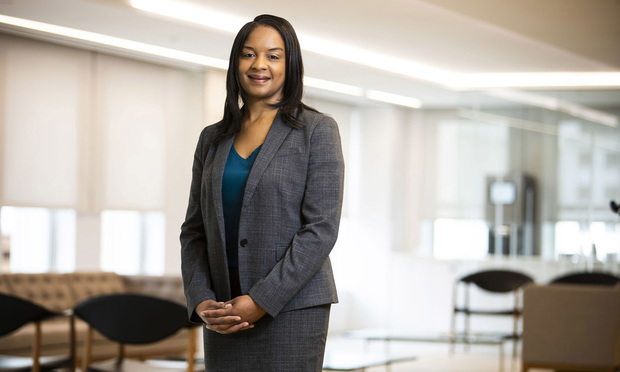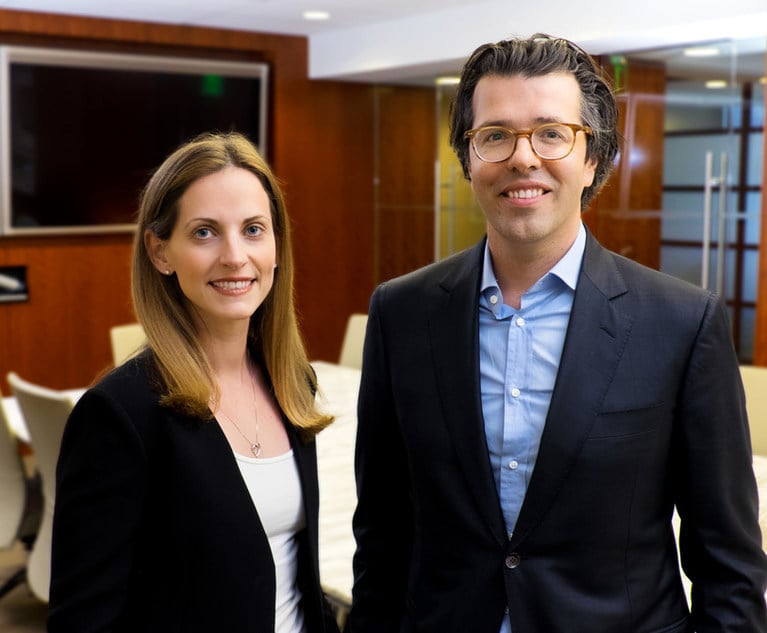And Then There Were None: Latham Cuts Long-Running Patent Case Down to Zero Damages
After nine years of litigation, U.S. District Judge Liam O'Grady says there was no evidence to support a jury award of $1.75 million against Adobe Systems.
June 21, 2019 at 02:22 PM
5 minute read
The original version of this story was published on National Law Journal
 Latham & Watkins partner Tara Elliott.
Latham & Watkins partner Tara Elliott.
It's taken nine years, two judges, multiple law firms, a jury trial and a couple of detours to the U.S. Court of Appeals for the Federal Circuit. But Adobe Systems Inc. is finally out of a lawsuit over encryption patents, with zero damages.
TecSec Inc., a company founded by a former director of the CIA's Cryptographic Center, has been pursuing Adobe and several other technology giants in the Eastern District of Virginia since 2010, accusing them of infringing its patents on multilayered encryption. TecSec argued at trial that Boeing had paid $10 million for a license and Microsoft paid $16.5 million to settle previous litigation, but that Adobe had been trying to “wait out” TecSec's three founders, who are in their 70s and 80s.
TecSec was seeking as much as $41 million in the lead-up to trial, which with trebling could have made the case worth well over $100 million.
A Latham & Watkins team led by partners Tara Elliott, Max Grant and Michael Morin persuaded U.S. District Judge Liam O'Grady of the Eastern District of Virginia to limit the damages period on the ground that TecSec hadn't provided notice of infringement before suing. Jurors awarded $1.75 million in December for Adobe's direct infringement but absolved the company of trying to induce its customers to infringe.
O'Grady then ruled Tuesday that there was no evidence to support that $1.75 million award. “At trial, TecSec pursued a damages theory tied solely to Adobe's sales of Adobe Acrobat to customers,” he wrote. “The testimony of a reasonable royalty based on sales to customers alone cannot support any award of direct infringement damages.”
“We are grateful that the court rightfully vacated the jury's trial damages award … as there was no evidence to support any award of damages once the jury correctly found that Adobe was not liable for induced infringement,” Latham's Elliott said in a written statement.
TecSec sued Adobe, IBM Corp., Cisco Systems Inc., Oracle Corp., SAP SE and others in 2010. U.S. District Judge Leonie Brinkema granted IBM summary judgment of non-infringement in 2011. Since then the litigation has focused on Adobe, with TecSec twice winning rulings from the Federal Circuit reversing Brinkema's claim construction orders.
The second time around TecSec asked for reassignment to a new trial judge. The Federal Circuit refused, though it did say that “the extended pendency of this litigation raises questions as to the efficiency of the district court's one-defendant-at-a-time approach.”
On remand, Brinkema announced she was voluntarily recusing herself. “Although I have no ill feelings towards TecSec, I must say in this particular case, I really do have a very strong belief that despite the Federal Circuit seeing it differently, that my constructions were appropriate,” she explained at a November 2016 hearing.
The case was assigned to O'Grady, who turned away Adobe's argument that the patents are ineligible for protection under Section 101. Adobe then brought in Latham last summer as the case was approaching trial.
In opening statements, Hunton Andrews Kurth partner Michael Oakes told jurors that Adobe was “at the top of the list” of technology giants using TecSec's technology without authorization.
Although Adobe had admitted infringing the patent only once, Adobe executive John Landwehr had explained to Adobe customers on a company blog how to encrypt PDFs on multiple levels, Oakes said. “Adobe can be held responsible for the infringement of its customers if Adobe knew about TecSec's patents and instructed them to use the technology in a way that infringed the patents,” he told jurors.
Latham partner Grant said in openings that Landwehr had simply “demonstrated the obvious”—that users could put an encrypted or a non-encrypted file in an envelope and then encrypt the envelope.
“If multi-level encryption mattered, you'd see evidence that Adobe provided instructions about how to do it in our user manuals. You won't,” he told jurors. “If multi-level encryption mattered, you would hear evidence that our customers were demanding it. They weren't.”
Jurors ultimately found that all six of the asserted patent claims are valid and directly infringed by Adobe. But they found no indirect infringement by Adobe customers.
That was fatal to TecSec's damage award, O'Grady ruled Tuesday. ”Now that the court has had the opportunity to review the record and the more thorough arguments of counsel,” he wrote, “the court finds that the damages experts' testimony could not have served as a basis for an award of direct infringement damages as a matter of law.”
Latham's team also included counsel Rachel Weiner Cohen and associates Dale Chang, Brett Sandford and Will Orlady. Adobe's senior director for intellectual property, Karen Robinson, and legal counsel Andy Nguyen headed Adobe's in-house team.
This content has been archived. It is available through our partners, LexisNexis® and Bloomberg Law.
To view this content, please continue to their sites.
Not a Lexis Subscriber?
Subscribe Now
Not a Bloomberg Law Subscriber?
Subscribe Now
NOT FOR REPRINT
© 2025 ALM Global, LLC, All Rights Reserved. Request academic re-use from www.copyright.com. All other uses, submit a request to [email protected]. For more information visit Asset & Logo Licensing.
You Might Like
View All
Litigator of the Week: Reversing a $2B Trade Secret Verdict, the Largest in Va. History

Litigators of the Week: Irell Duo Lands Another Big West Texas Win, This Time $240M for StreamScale

Litigators of the Week: In Delaware Chancery Trial, Latham Defends Oracle's $9.3B NetSuite Deal
Trending Stories
- 1‘The Decision Will Help Others’: NJ Supreme Court Reverses Appellate Div. in OPRA Claim Over Body-Worn Camera Footage
- 2MoFo Associate Sees a Familiar Face During Her First Appellate Argument: Justice Breyer
- 3Antitrust in Trump 2.0: Expect Gap Filling from State Attorneys General
- 4People in the News—Jan. 22, 2025—Knox McLaughlin, Saxton & Stump
- 5How I Made Office Managing Partner: 'Be Open to Opportunities, Ready to Seize Them When They Arise,' Says Lara Shortz of Michelman & Robinson
Who Got The Work
J. Brugh Lower of Gibbons has entered an appearance for industrial equipment supplier Devco Corporation in a pending trademark infringement lawsuit. The suit, accusing the defendant of selling knock-off Graco products, was filed Dec. 18 in New Jersey District Court by Rivkin Radler on behalf of Graco Inc. and Graco Minnesota. The case, assigned to U.S. District Judge Zahid N. Quraishi, is 3:24-cv-11294, Graco Inc. et al v. Devco Corporation.
Who Got The Work
Rebecca Maller-Stein and Kent A. Yalowitz of Arnold & Porter Kaye Scholer have entered their appearances for Hanaco Venture Capital and its executives, Lior Prosor and David Frankel, in a pending securities lawsuit. The action, filed on Dec. 24 in New York Southern District Court by Zell, Aron & Co. on behalf of Goldeneye Advisors, accuses the defendants of negligently and fraudulently managing the plaintiff's $1 million investment. The case, assigned to U.S. District Judge Vernon S. Broderick, is 1:24-cv-09918, Goldeneye Advisors, LLC v. Hanaco Venture Capital, Ltd. et al.
Who Got The Work
Attorneys from A&O Shearman has stepped in as defense counsel for Toronto-Dominion Bank and other defendants in a pending securities class action. The suit, filed Dec. 11 in New York Southern District Court by Bleichmar Fonti & Auld, accuses the defendants of concealing the bank's 'pervasive' deficiencies in regards to its compliance with the Bank Secrecy Act and the quality of its anti-money laundering controls. The case, assigned to U.S. District Judge Arun Subramanian, is 1:24-cv-09445, Gonzalez v. The Toronto-Dominion Bank et al.
Who Got The Work
Crown Castle International, a Pennsylvania company providing shared communications infrastructure, has turned to Luke D. Wolf of Gordon Rees Scully Mansukhani to fend off a pending breach-of-contract lawsuit. The court action, filed Nov. 25 in Michigan Eastern District Court by Hooper Hathaway PC on behalf of The Town Residences LLC, accuses Crown Castle of failing to transfer approximately $30,000 in utility payments from T-Mobile in breach of a roof-top lease and assignment agreement. The case, assigned to U.S. District Judge Susan K. Declercq, is 2:24-cv-13131, The Town Residences LLC v. T-Mobile US, Inc. et al.
Who Got The Work
Wilfred P. Coronato and Daniel M. Schwartz of McCarter & English have stepped in as defense counsel to Electrolux Home Products Inc. in a pending product liability lawsuit. The court action, filed Nov. 26 in New York Eastern District Court by Poulos Lopiccolo PC and Nagel Rice LLP on behalf of David Stern, alleges that the defendant's refrigerators’ drawers and shelving repeatedly break and fall apart within months after purchase. The case, assigned to U.S. District Judge Joan M. Azrack, is 2:24-cv-08204, Stern v. Electrolux Home Products, Inc.
Featured Firms
Law Offices of Gary Martin Hays & Associates, P.C.
(470) 294-1674
Law Offices of Mark E. Salomone
(857) 444-6468
Smith & Hassler
(713) 739-1250







